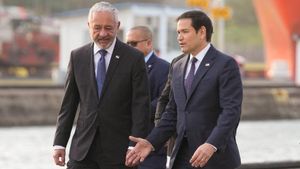Elon Musk, the head of DOGE, is officially recognized as a special government employee by the U.S. federal government. This announcement, confirmed by the White House on February 3, 2025, allows Musk to serve under President Donald Trump without receiving financial compensation for his efforts.
The designation of "special government employee" typically applies to individuals who work for limited timeframes, capped at 130 days over any rolling 365-day period. This role is typically used for individuals with expertise who are not going to be long-term employees. Significantly, it also enables Musk to bypass some of the typical ethics and conflict-of-interest rules required of full government employees.
White House Press Secretary Karoline Leavitt stated, "I can confirm he's a special government employee. I can also confirm he has abided by all applicable federal laws," when addressing questions about Musk's official capacity.
Despite his previous engagement with the administration, the specifics surrounding Musk's security clearance were ambiguous, with Leavitt promising to provide answers later. Alongside his appointment, Musk received government email access and office space within the White House complex.
Critics quickly pointed to the potential for conflicts of interest arising from Musk's position, especially considering his extensive business dealings through SpaceX and Tesla—both entities which have benefited immensely from government contracts amounting to billions of dollars. Legal experts express concern over how his role could influence federal decisions affecting his businesses.
Kathleen Clark, a law professor with expertise in government ethics at Washington University, articulated these concerns, remarking, "If they do not make public his financial disclosure, it may make it impossible for the public and non-governmental organizations and journalists to hold him and the government accountable."
Musk's role is imagined by Trump to be central to increasing the efficiency of federal operations, as he heads the Department of Government Efficiency (DOGE). Under the DOGE title, Musk and his team have already attempted significant changes within the government framework, including plans to shut down the U.S. Agency for International Development (USAID)—actions which triggered uproar within political circles.
President Trump defended Musk, stating, "Elon can’t do and won’t do anything without our approval. And we’ll give him the approval where appropriate; where not appropriate, we won’t," emphasizing the balance of control between Musk's initiatives and the administration's oversight.
Continuing the administration's cost-cutting emphasis, Musk blurted on X, the platform he owns, "Nothing polls higher than cutting government spending," highlighting his dedication to government efficiency proposals.
Despite facing backlash from those opposing his power consolidation within federal agencies, Trump reiterated his support during media interactions, declaring, "Elon is doing a good job. He’s a big cost-cutter." The dynamic between Musk, Trump, and the federal workforce continues to cultivate concerns about adequate oversight and regulation, especially with union responses to Musk's movement within government agencies.
Democratic lawmakers have voiced their discontent, asking whether Musk’s consolidation of power within the administration is appropriate, and if he can maintain operational separateness from financial interests linked to his corporate ventures. They question the lack of accountability processes through the special government employee framework. Criticism mounted as the U.S. Agency for International Development's headquarters faced abrupt lockdowns and operational shifts directed by Musk's directives.
Legal analysts suggest Musk’s special government employee designation might allow him to avoid extensive financial disclosures published for public awareness, which could hinder monitoring his potential conflicts of interest.
Through the successful negotiation of government contracts and regulatory access, Musk's developing role poses potentially transformative paths for federal efficiencies and challenges for transparency. Critics remain vigilant about how his involvement may reshape the administration’s dealings, with promises for cuts juxtaposed against calls for ethical governance.
Elon Musk's increasing influence within federal structures will necessitate close scrutiny of his actions and their ramifications, as the dynamics between tech entrepreneurship and government leadership continue to evolve.



